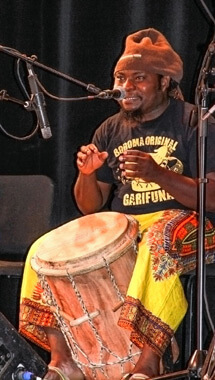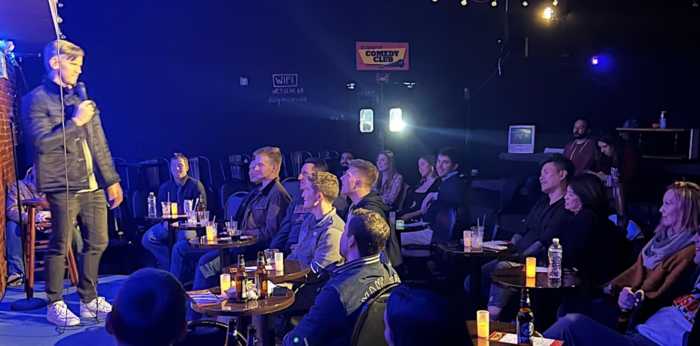A New York City/Queens gem, Flushing Town Hall bills itself as a venue of “global arts for a global community.” Last Sunday, a summer wrap-up/fall kick-off with the Afri-Garifuna Jazz Ensemble, which fuses jazz and the language and rhythms from traditional Garifuna music, attracted one of the most diverse assemblages seen in a New York audience.
(Come Sept. 3, monthly jazz jam sessions begin there, followed by extensive rich schedule including an American music festival, classical and jazz programming, and other culture workshops. www.flushingtownhall.org.)
Leading off the afternoon and with passion and encouragement, Garifuna dancer and teacher Mariano Martinez with Scarlet A. Jones led adventurous audience members into a series of Garifuna dance movements (“move those hips”) and his version of the Garifuna Slide. Martinez is the dance equivalent of the Afri-Garifuna Jazz Ensemble, bridging the contemporary and folkloric.
On Sunday, the Ensemble performed two sets. Co-founder, vocalist Lucy Blanco opened the afternoon with Tagueira (Homeland), their arrangement of the unofficial anthem, sung in Garifuna with a portion in English. During the sets, “The Days of Wine and Roses,” in English, was set to a paranda rhythm and “Bye Bye Blackbird” to a punta rhythm. Closing the afternoon of music and movement, the dance floor was filled when Blanco sang Summertime in Garifuna; translated by Blanco’s musical partner, co-founder James Lovell.
It was chance that brought together Garifuna heritage jazz singer Blanco, who had recently returned from 25 years in Los Angeles with an idea, and traditional Garifuna drummer James Lovell, who strives to carry on Garifuna culture through its music and language. Only four years old, “the Biko Center in Brooklyn allowed the space to develop our repertoire,” says Blanco.
Garifuna is an Arawak-based language having developed when kidnapped Africans, destined for slavery, swam from their crashed boats to St. Vincent and married indigenous Arawak and Carib Indians. The language is on the UN endangered language list.
As a child growing up in the Bronx and parents from Honduras, Garifuna (and Spanish) were Blanco’s first languages, long dormant as she assimilated into American culture. “The language is coming to life and coming back,” she admits, having lost most. Through this project she is relearning, with Lovell as her guide.
“Our musicians bring in their jazz musical vocabulary and are open to learning a new genre they haven’t heard before, fusing it with their experience to create something new,” she says. “What we’re doing requires time,” of the mixing of these two music forms. With an extensive cultural background, James Lovell brings in the language and songs, handed down orally.
In his absence – Lovell is running his annual summer children’s music workshops in St. Vincent – Garifuna traditional drummer Bodoma performed. Bodoma has his own company by the same name, performing locally and abroad. With his two drummers, he joined Blanco, piano player Dre Barnes, bassist Hilliard Greene, percussionist Gary Fritz (Trinidadian via Africa-descent), and the dancers for a great afternoon. Throughout the sets, Blanco encouraged the audience to dance.
Flushing Town Hall is celebrating its 35th anniversary; now under the directorship of Ellen Kodadek. “It’s so comfortable here with great acoustics,” says Blanco, explaining that last year the Afri-Garifuna Ensemble played there, as part of a cultural series where two countries were paired together on the program – teaching dance and performing. We represented St. Vincent and the Grenadines and were paired with the Dominican Republic that played Kompalsa music.

Photo by Tequila Minsky
























